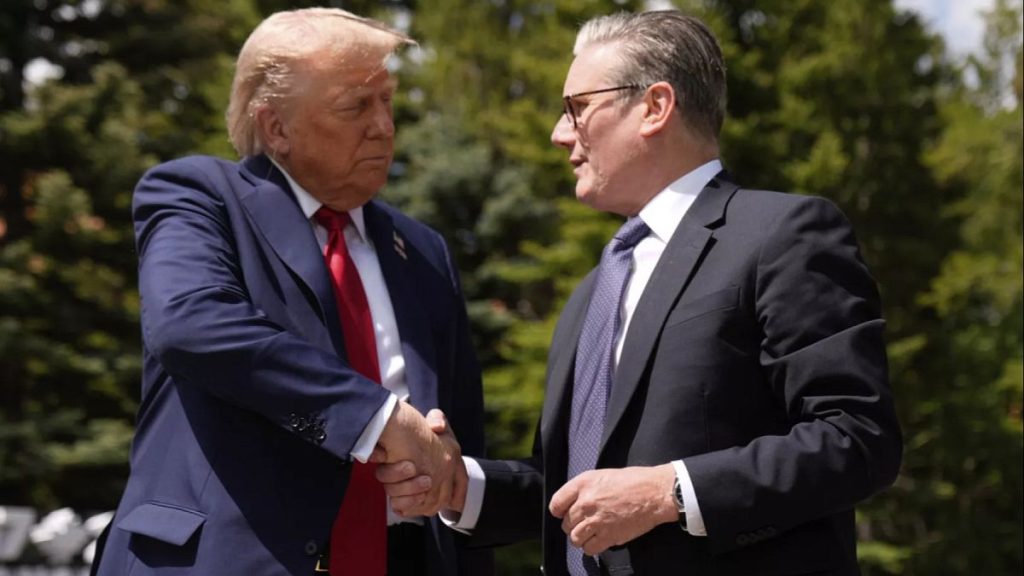U.S. President Donald Trump and British Prime Minister Keir Starmer recently signed a landmark trade agreement aimed at reducing tariffs affecting the UK’s automotive and aerospace sectors. Announced during the Group of Seven (G7) summit in the Canadian Rockies, the deal is designed to foster economic relations between the two nations. While the pact represents significant progress, discussions on the handling of steel tariffs remain ongoing.
| Article Subheadings |
|---|
| 1) Overview of the Trade Agreement |
| 2) Benefits for the Automotive and Aerospace Sectors |
| 3) Unresolved Issues: Steel and Pharmaceuticals |
| 4) Broader Implications for Global Trade |
| 5) Reactions from Industry Leaders |
Overview of the Trade Agreement
The trade agreement signed by Presidents Trump and Starmer marks a critical step in U.S.-UK relations, particularly following heightened tensions in global commerce. The leaders made the announcement amidst discussions at the G7 summit, revealing that the agreement would considerably reduce tariffs on British cars and aerospace products. Specifically, this deal will lead to a decrease in U.S. tariffs on UK aerospace materials, which had been subject to a 10% duty. Additionally, tariffs on British automobiles will be lowered to 10%, a significant reduction from the current 27.5%, opening the market for up to 100,000 vehicles per year. This agreement fosters an environment of mutual economic support and underscores the commitment both nations have towards reinforcing their trade ties post-Brexit.
Benefits for the Automotive and Aerospace Sectors
The reduced tariffs carry considerable implications for the British automotive and aerospace industries, positioning them to gain significantly from the updated trade dynamics. With the elimination of tariffs on aerospace products, British firms like Rolls-Royce stands to benefit immensely, enhancing their competitiveness in the global market. The decrease in tariffs for automotive exports is equally critical; it offers UK car manufacturers a more favorable position against international competitors. This strategic shift is aimed at creating jobs and boosting economic stability, as underlined by statements from UK Business and Trade Secretary Jonathan Reynolds, who asserted that the agreement protects “jobs and livelihoods in some of our most vital sectors.” The positive outlook reflects a revitalized confidence in Britain’s industrial capabilities.
Unresolved Issues: Steel and Pharmaceuticals
Despite the advances made in the automotive and aerospace discussion, significant unresolved issues remain, particularly concerning steel and pharmaceuticals. The anticipated zero tariffs on British steel—a crucial factor for sustaining the UK’s struggling steel industry—did not materialize in this agreement. The UK’s steel production has experienced a dramatic decline, with output plummeting by 80% since the late 1960s, largely due to competition from cheaper imports, especially from China. Discussions are ongoing about determining the quotas for U.S. imports of British steel, with Commerce Secretary Howard Lutnick tasked to provide clarity on the specifics. Furthermore, there was no finalized agreement pertaining to pharmaceuticals, as negotiations are still underway. The continuation of these discussions signals that both parties recognize the importance of these sectors in the broader economic framework.
Broader Implications for Global Trade
The agreement between the U.S. and UK may set a precedent that influences global trade relations. Discontent over trade tariffs has led to fears of a worldwide trade war; thus, successful negotiations of this magnitude could pave the way for similar agreements with other nations. President Trump has previously voiced intentions to renegotiate trade deals with several countries, and the endorsement of this pact reflects a strategic move to stabilize U.S. trade relationships globally. The focus on the UK as a key partner may prompt other countries to reevaluate their positions and consider how to align their trade policies favorably with both the U.S. and UK.
Reactions from Industry Leaders
Industry leaders in the UK have expressed approval regarding the recent trade agreement. Mike Hawes, the Chief Executive of the Society of Motor Manufacturers and Traders, heralded the deal as “great news for the UK automotive industry.” Such positive responses underscore the general optimism among business stakeholders, as the agreement is expected to yield significant economic opportunities. The commentary from the industry suggests a collective hope for continued expansion in export capabilities, especially in the automotive and aerospace sectors. These sectors are viewed as critical for long-term job creation and economic resilience, bolstered by the newfound access to the U.S. market.
| No. | Key Points |
|---|---|
| 1 | The recently signed trade deal aims to significantly reduce tariffs on UK automotive and aerospace exports to the U.S. |
| 2 | The agreement seeks to protect jobs and enhance economic growth in vital sectors for both nations. |
| 3 | Key issues remain unresolved, including tariff reductions for British steel and pharmaceuticals. |
| 4 | The successful negotiation may influence future global trade dynamics and agreements. |
| 5 | Industry leaders have welcomed the deal, highlighting its significance for job creation and economic resilience. |
Summary
The trade deal between the U.S. and UK represents a significant milestone in enhancing trade relations, particularly focusing on the automotive and aerospace sectors. As both nations work through unresolved issues such as steel tariffs, the agreement serves to underscore the importance of strategic cooperation in a complex global trade environment. With positive responses from industry leaders and implications for broader trade relations, this landmark agreement is poised to play a crucial role in shaping economic policies moving forward.
Frequently Asked Questions
Question: What are the key components of the recent U.S.-UK trade deal?
The trade deal primarily focuses on reducing tariffs on UK automotive and aerospace products, allowing greater access for British exports to the U.S. market.
Question: Why is the agreement significant for the UK steel industry?
The agreement’s potential lack of zero tariffs on British steel is crucial, as the UK steel industry is struggling, and tariff reductions could help restore competitiveness.
Question: What future implications might this trade deal have on global trade?
The successful negotiation could influence other nations to pursue similar agreements, potentially reshaping global trade dynamics towards more cooperative arrangements.


